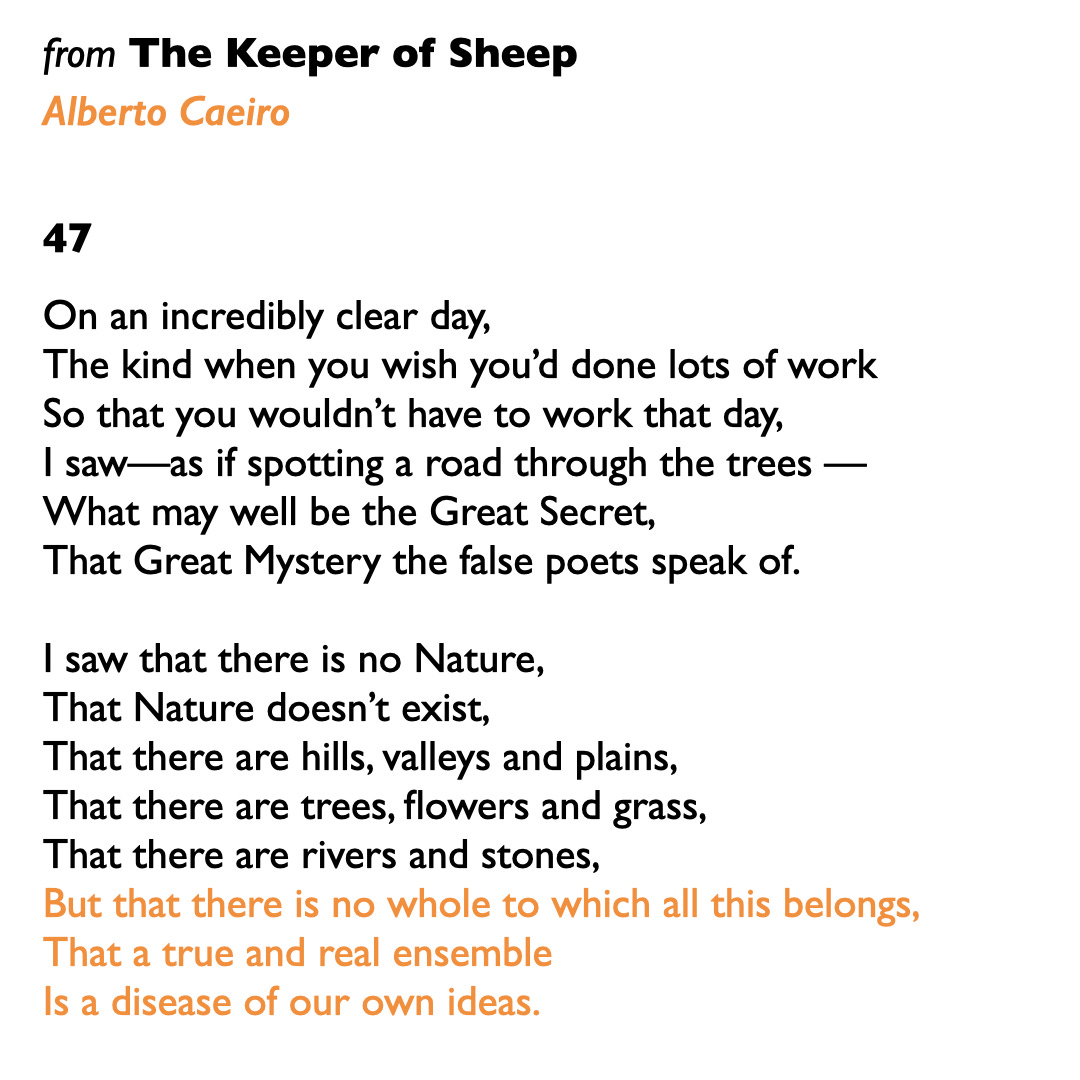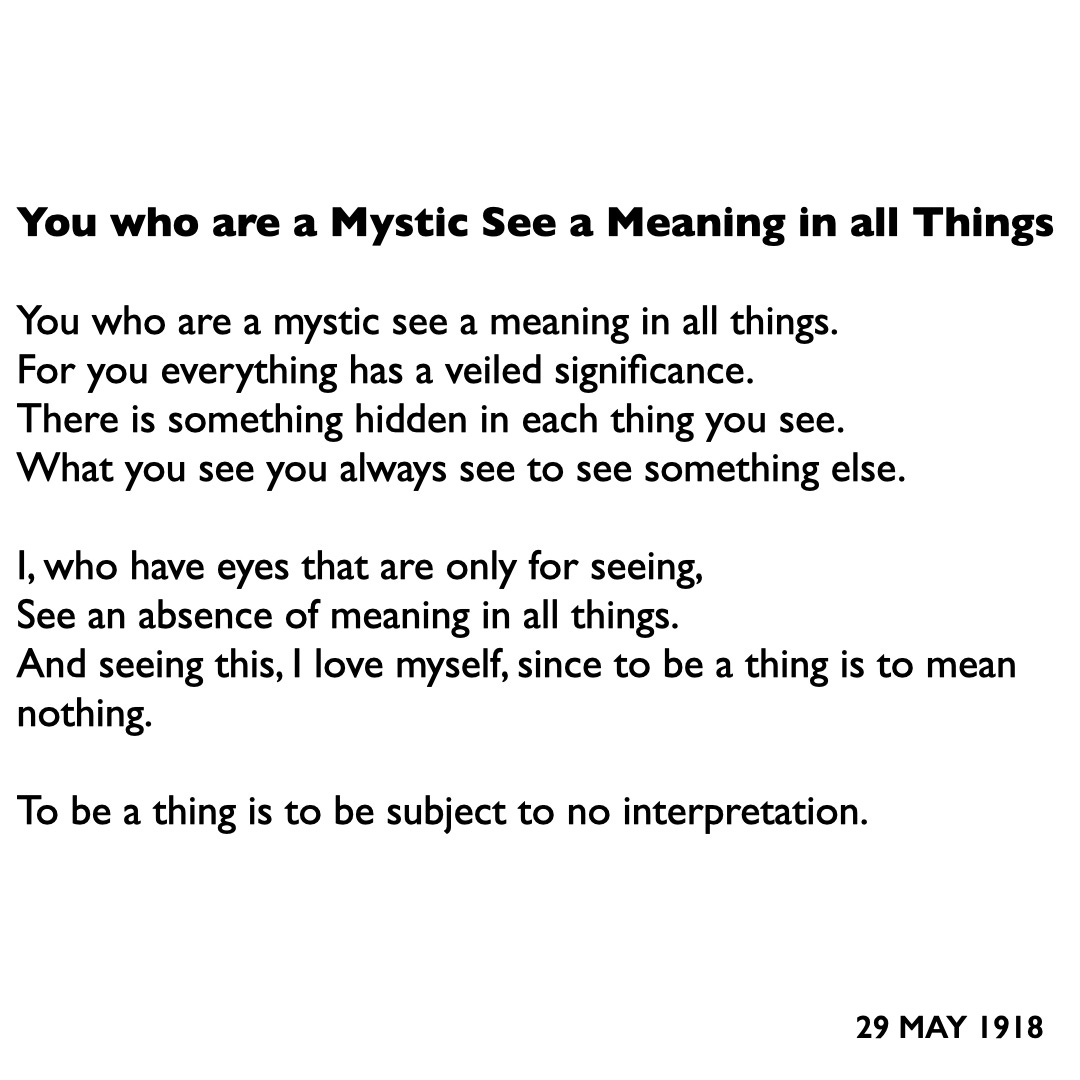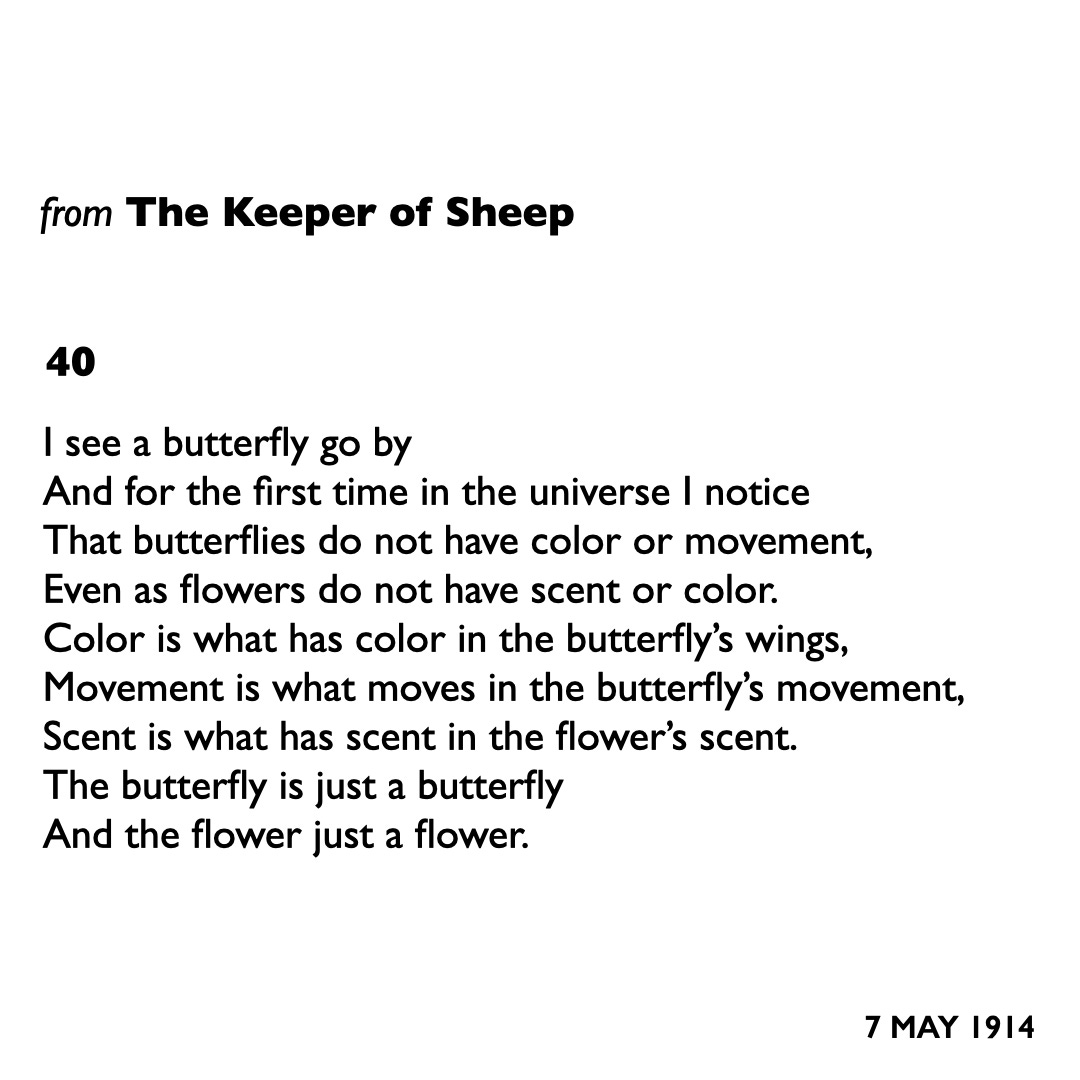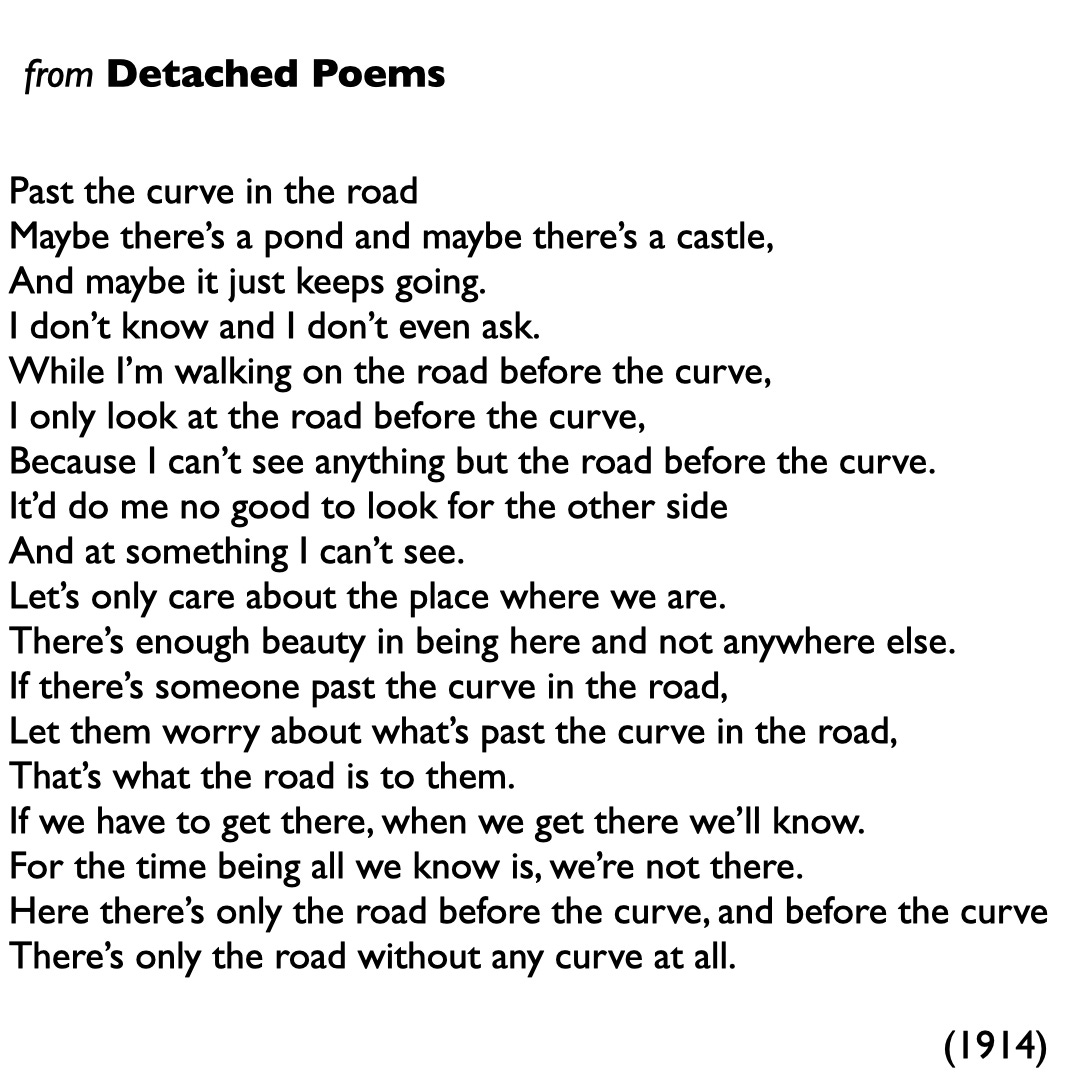Caeiro’s life cannot be narrated: there is nothing in it to be told. His poems were the life within him. In all else there was neither incident nor story. …. [Caeiro’s ‘ouevre’] came from something within us deeper than feeling or reason. To say any more would be to explain, which serves no end; to affirm any less would be to lie. Every work speaks for itself with its own voice in the language that shapes both work and voice. “If you have to ask, you will never know.” There is nothing to explain. Imagine attempting to explain to someone a language he did not speak.
Ignorant of life and nearly so of letters, practically without companionship or culture, Caeiro created his work through a deep and imperceptible progress, like that which drives the logical development of civilizations through unconscious humanity’s conscious mind. His was a progress of sensation, of ways of feeling, and an intimate evolution of thought derived from these progressive sensations. Through some superhuman intuition, as one founding a religion (yet the mantle of “religious” does not suit him — witness his repudiation of all religion and metaphysics), this man described the world without thinking about it, and created a concept of the universe — a concept thoroughly resistant to exegesis.
(Italics mine)
This is a description of the remarkable Portuguese poet Alberto Caeiro (1889-1915), excerpted from Ricardo Reis’s Preface to Caeiro’s “Complete Poems”. Reis, in assessing both the persona and the output, creates a portrait that outlines a particular kind of anti-intellect. I am using this word deliberately, also as a throwback to the previous post where I referred briefly to fascism as a political movement that denies intellectual depth. I was talking about this idea while analysing communities and individuals as organisms of interaction and control. Caeiro’s writing, however, propels this same impulse of anti-intellectual activity, but as a philosophical movement whose origins and implications have nothing to do with fascism as a form of social control.
Reis, in his preface locates the origins of this mode of interaction with the world, as the “absolute essence of Paganism”. But he separates Caeiro’s writing from the Classical Greeks and Romans, while explaining that those who were in the midst of that movement never fully ‘thought about it’ objectively. However, Caeiro’s suspension of thought and his ‘sensationist’ interaction with the world was both intuitive, and without the familiar communal factors that turn ideology into religion.
A fascinating poem, it is in some sense, an exemplar of Caeiro’s view of the universe. The poem is somewhat confusing when seen as a poetic product because it employs thoughtful dexterity in its creation. Nevertheless, it denies what seems as a natural reflex for aesthetic luminosity through its thematic exploration with the character of ‘Nature’. This nihilistic gaze illuminates something quite extraordinary - a way of life. Caeiro’s entire body of work is reflective of this peculiar restraint. But, as is seen in this poem it is not devoid of wonder. I find that his style of writing embodies an immersion that is absolute. It is the liberation inherent in lived reality. It is perhaps the very opposite of artifice. Like the mystics who denied any unifying presence in the composition of the world, and in events, Caeiro denies his own canonisation. For him, the ‘great mystery’ is that there isn’t one. Very Kung-fu panda/U.G. Krishnamurthy no? But then…
Caeiro oscillates between dry realism and wonder, but his poetry is more than simple observation. In taking this psychological reality of the thingness of every element of his environment to its logical conclusion, he sets out a blueprint for the formation of a specific kind of relationship between the body and the world. With the logical mind as stylus, he launches an assault on imagination, but what opens up is a world of sensation, of feeling. He talks of the river, of stones and sunsets, of brooks and sheep; he imagines himself, at times, as a shepherd - and this imagination is outlined by a cynicism that brings both the poet and the reader back to the senses.
But is such a vision, devoid of feeling? Is it fascist, in its censorship of creative engagement with the world of ideas? Or is it pure, and unadulterated, simply a celebration of sensation? I would like to draw on Diane Ackerman’s plea for sensation from her masterpiece A Natural History of the Senses:
The senses don’t just make sense of life in bold or subtle acts of clarity, they tear reality apart into vibrant morsels and reassemble them into a meaningful pattern. They take contingency samples. They allow an instance to stand for a mob. They negotiate and settle for a reasonable version and make small, delicate transactions. Life showers over everything, radiant, gushing. The senses feed shards of information to the brain like microscopic pieces of a jigsaw puzzle.
This represents Caeiro’s poetic voice, not his poetry itself. His is not the splendour of the imagists, the attention to detail of the Japanese masters, and nor is it the sentimentality of the romantics, this is something else altogether. He reassembles the objects of the world - and in this regard people are no different from animals or inanimate things - as a careful wood carver would, while crafting pieces of a chessboard. But as he crafts them, with obsessive, almost annoying myopia, he arrives at an objectivity that is strangely intimate, and uncharacteristically tied up with feeling. I sometimes feel that it is not so much that this approach is intuitive, but it is a learned reflex - Caeiro doesn’t allow himself the weakness of ideology, because “there’s enough beauty in being here and not anywhere else”.
‘Let’s only care about the place we are’ - a radical acceptance of the human position. There is no vantage, all control is an illusion - everything is at is, and so, it will remain.
The pieces of this chessboard are myriad, and 64 squares are far too limiting, but yes, there is black, and there is white.
Now. Let me add one more important piece of information to this exposition of the poetry of Alberto Caeiro. Those familiar with the poet, are already aware of what I am about to say.
Alberto Caeiro isn’t real. Nor is the poet who anthologised and edited Caeiro’s poetry - Ricardo Reis. Both Caeiro and Reis are characters in the imaginarium of the Portuguese master, Fernando Pessoa. I have already talked about Pessoa’s selves, and in particular about the idea of ‘absent presents’ in a previous post. I wanted to share the commitment Pessoa had to what he called an “othering of self”. This is a representative attempt to interact with the work of his individual heteronyms as real people. Caeiro’s poetry is read as it is intended, as the cornerstone of a methodology addressed by cultural, social and political realities that are distinct. This is a conscious choice - usually, the awareness of the hand of puppeteer is foregrounded in criticism of Pessoa’s various poetic selves.
I admire this colourful dismantling of persona into varied singularities- it is not that he perfected it, in fact, he constantly oscillated between the desire for control and order, and the craving, the affinity for chaos.
What I draw from this is, a most unique drive for survival, that channels some ‘disquiet’, some essential lack into art. This doesn’t seek completion, nor does it seek validation, it simply is.
If the poetry, and the commentary, resonate with you, do consider ‘buying me a coffee’. (Matlab, if you can’t, that’s also fine, obviously. This is a free newsletter)
Note: Those, not in India, who’d like to support the work I do at Poetly, do write to me - poetly@pm.me. (Paypal seems to have left the building, still figuring it out)
Thanks for reading Poetly! Do subscribe if you are not reading this in your inbox. Cheers!








